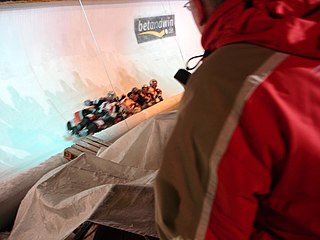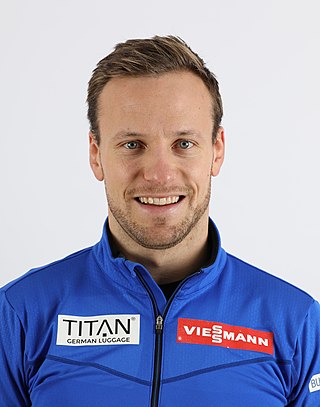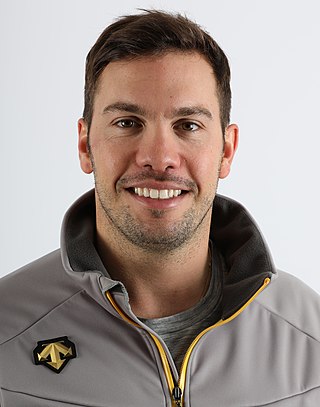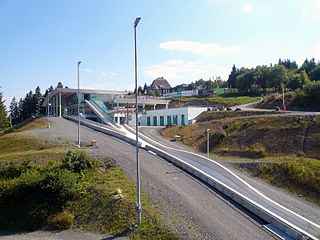Men's singles
| Medal | Athlete | Time |
|---|---|---|
| Gold | ||
| Silver | ||
| Bronze |
The FIL European Luge Championships 1914 took place in Reichenberg, Bohemia (then under Austria-Hungary, now Liberec, Czech Republic) under the auspices of the Internationaler Schlittensportsverband (ISSV - International Sled Sports Federation in (in German)), a forerunner to the International Luge Federation.
| Medal | Athlete | Time |
|---|---|---|
| Gold | ||
| Silver | ||
| Bronze |
| Medal | Athlete | Time |
|---|---|---|
| Gold | ||
| Silver | ||
| Bronze |
Only the gold medalist was listed in the bsd.de reference shown in the References section below. The Women's race war not officially part of the European Luge Championships 1914, but were held at the samo occasion as Meisterschaft der österreichischen Sudetenländer (Championship of the Austrian Sudetenland). There were also held a mixed doubles event, won by Wera Czernin and O. Weißenstein. [1]
| Medal | Athlete | Time |
|---|---|---|
| Gold | ||
| Silver | ||
| Bronze |
The silver medalist pair of Kauschka and Gfäller are the only time in the championships' history where the medal winners were not from the same nation. However, it was not representatives of national associations that started at these championships, but individual starters. Thus, a greater mix among the drivers was possible.
| Rank | Nation | Gold | Silver | Bronze | Total |
|---|---|---|---|---|---|
| 1 | 3 | 1.5 | 2 | 6.5 | |
| 2 | 0 | 0.5 | 0 | 0.5 | |
| Totals (2 entries) | 3 | 2 | 2 | 7 | |
Thomas Schwab is a West German luger who competed in the late 1980s. Together with Wolfgang Staudinger he won the bronze medal in the men's doubles event at the 1988 Winter Olympics in Calgary, representing West Germany.
The FIL European Luge Championships, part of the International Luge Federation (FIL) have taken place since 1914. From 1914 to 1934, these championships were part of the Internationaler Schlittensportsverband. From 1935 to 1956, the championships were held under the auspices of the Fédération Internationale de Bobsleigh et de Tobogganing. Since 1962, the event has been under the auspices of the FIL and has been held in even-numbered years since 1980. Since 2012, it is held annually within a preselected World Cup stages in the so-called race-in-race mode. The results of non-European athletes at these World Cup stages are not counted for European Championships standings.

The International Luge Federation (French: Fédération Internationale de Luge de Course(FIL); German: Internationaler Rennrodelverband) is the main international federation for all luge sports. Founded by 13 nations at Davos, Switzerland in 1957, it has members of 53 national luge associations as of 2009 and is based in Berchtesgaden, Germany. In reaction to the 2022 Russian invasion of Ukraine, in March 2022 the FIL banned all Russian athletes, coaches, and officials from its events, suspended all Russian officials appointed to its Commissions and Working Groups, and deemed Russia ineligible to host any of its events.
The FIL European Luge Championships 1939 took place in Reichenberg, Czechoslovakia for the second time under the auspices of the Fédération Internationale de Bobsleigh et de Tobogganing under their "Section de Luge", a trend that would continue until the International Luge Federation (FIL) was formed in 1957. Reichenberg hosted the first European championships in 1914. It would also mark the last time these championships would be held prior to the outbreak of World War II later that year.
The FIL European Luge Championships 1962 took place in Weißenbach, Austria. It marked the first time event was held under the auspices of the International Luge Federation (FIL) which was formed in 1957. Also, it was the first time the championships had been held after being cancelled from 1957 to 1961.
Josef Feistmantl was an Austrian luger who competed from the mid-1950s to the early 1970s. He competed at three Olympic Games.
Tobias Schiegl is an Austrian former luger who competed from 1993 to 2010. He won fourteen medals at the FIL World Luge Championships with five golds, five silvers, and four bronzes. He competes in doubles with his older cousin Markus.
Markus Schiegl is an Austrian former luger who has competed from 1987 to 2010. He won fourteen medals at the FIL World Luge Championships with five golds, five silvers, and four bronzes. Schiegl competes in doubles with his younger cousin Tobias.

The Oberhof bobsleigh, luge, and skeleton track is a venue used for bobsled, luge and skeleton located in Oberhof, Germany.

The Altenberg bobsleigh, luge, and skeleton track is a venue in Germany for bobsleigh, luge, and skeleton. Located in Saxony in eastern Germany, it is northwest of Altenberg, near the border with the Czech Republic.

The Königssee bobsleigh, luge, and skeleton track is a venue in Germany for bobsleigh, luge and skeleton, located in Schönau am Königssee, Bavaria, near Königssee and the border with Austria. Completed 56 years ago in 1968, it is the first permanent, artificially refrigerated bobsleigh, luge, and skeleton track in the world. In July 2021, the track was severely damaged by the floods that affected the European continent, and is currently under reconstruction.

The Olympic Sliding Centre Innsbruck is a venue for bobsleigh, luge and skeleton located in Igls, Austria. The most recent version of the track was completed in 1975 and is the first permanent, combination artificially refrigerated bobsleigh, luge, and skeleton track, serving as a model for other tracks of its kind worldwide. It hosted the bobsleigh, luge, and skeleton competitions for the 2012 Winter Youth Olympics.

Felix Loch is a German luger and Olympic champion. He has been competing since 1995 and on the German national team since 2006. He has won fourteen medals at the FIL World Luge Championships with twelve golds and two silvers. Loch's men's singles win in 2008 made him the youngest world champion ever at 18 years old. He is the youngest Olympic Gold Medalist in men's luge history. As of 2022, Loch is a triple Olympic gold medalist.

Tobias Arlt is a German luger, acting as a backdriver. He won a silver medal in the men's doubles event at the 2008 FIL World Luge Championships, a silver and a bronze at the 2010 FIL European Luge Championships, a gold medal at the FIL World Luge Championships 2013, and two gold medals at his debut Olympics, the 2014 Winter Olympics in Sochi.

Tobias Wendl is a German luger who has competed since 1993, acting as a front. He won a silver medal in the men's doubles event at the 2008 FIL World Luge Championships in Oberhof, Germany, a silver and a bronze at the FIL European Luge Championships 2010 in Sigulda, a gold at the FIL World Luge Championships 2013, and two gold medals at his debut Winter Olympics at the 2014 Winter Olympics in Sochi. He is also a Master Sergeant in the German Army.

The Winterberg bobsleigh, luge, and skeleton track is a bobsleigh, luge, and skeleton track located in Winterberg, Germany. It is the only track of its kind in the world with a turn that has corporate sponsorship with turn seven being sponsored by Veltins, a German brewery which has its headquarters located in neighboring Meschede.

The Paramonovo bobsleigh, luge, and skeleton track is a bobsleigh, luge, and skeleton located in Paramonovo, Russia, 60 kilometers (37 mi) outside of Moscow.
The men's luge at the 2010 Winter Olympics took place on 13–14 February 2010 at the Whistler Sliding Centre in Whistler, British Columbia. Germany's Felix Loch was the two-time defending world champion and won the gold medal with the fastest time in each of the four runs. The test event that took place at the venue was won by Germany's David Möller, who would win the silver medal in this event. Italy's Armin Zöggeler was the two-time defending Olympic champion and won a bronze medal in this event. The last World Cup event prior to the 2010 games took place in Cesana, Italy on 30 January 2010 and was won by Zöggeler, who also won the overall World Cup title.
The doubles luge event at the 2010 Winter Olympics was held on 17 February at the Whistler Sliding Centre in Whistler, British Columbia. Twenty teams participated. Austrian brothers Andreas and Wolfgang Linger, the defending Olympic and European champions, won the gold medal. The silver medal was also won by a pair of brothers, Andris and Juris Šics of Latvia. Germans Patric Leitner and Alexander Resch clinched the bronze medal after edging out Italians Christian Oberstolz and Patrick Gruber, who were in third place after the first run.